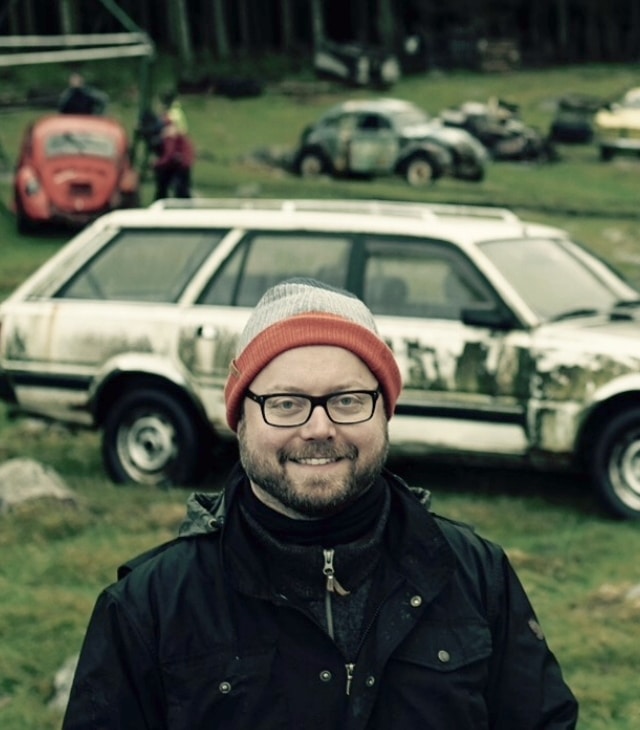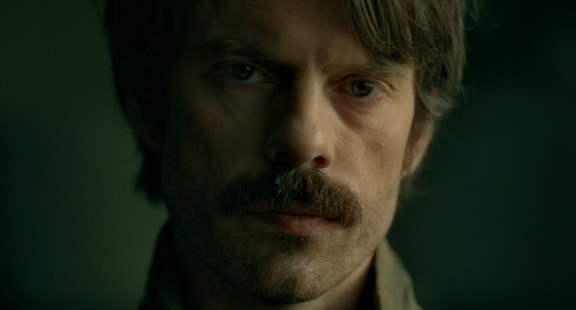Wat is dat!? In het eerste gedeelte van Quality Time maken we kennis met een zekere Koen, die heel erg opziet tegen een aanstaande familiereünie. Hij is bang om zoals ieder jaar weer mikpunt van flauwe grappen te zijn. Tot zover niets bijzonders. Alleen: Koen is geen acteur, maar een ronde witte stip op een rood vlak, waar hij gaandeweg gezelschap krijgt van andere stippen. Hij praat nog met een vervormde stem ook. Het verbazingwekkende is dat die ultra-minimalistische vormgeving niets afdoet aan de ontroering die de scène oproept.
Het maakte me direct razend nieuwsgierig naar de rest van deze eerste lange speelfilm van Daan Bakker (regie en scenario), misschien wel Nederlands meest originele nieuwe filmtalent. De drie volgende verhalen zijn minder extreem. Toch is er telkens dat prikkelend contrast tussen de vervreemdende vorm en de herkenbare emotionele beleving. Zo onderneemt de eenzame Kjell een psychotherapeutische tijdreis terug naar een ridderspel uit zijn jeugd. Pas het laatste deel van dit vijfluik over hoe het is om zonder handleiding in het leven te staan heeft een conventionele vorm.
Nederlandse Tiger
Quality Time was dit jaar op het Rotterdams Filmfestival de enige Nederlandse deelnemer aan de Tiger competitie. Deze tussen absurdisme, satire en aangrijpend drama laverende tragikomedie kreeg de prijs van de jongerenjury. Het vakblad Screen International prees de film als verfrissend afwijkend. Helemaal uit de lucht vallen kwam dit alles overigens niet. Bakkers korte film Bukowski kreeg in 2010 op het Nederlands Film Festival de prijs van de stad Utrecht voor meest veelbelovend nieuw talent. Ook zijn afstudeerfilm Jacco’s Film (2009) won al diverse prijzen. Jacco is een 10-jarige jongen die een eigen fantasiewereld bouwt om te ontsnappen aan de ruzies van zijn ouders. Wanneer ik Bakker kort voor de bioscooppremière van Quality Time aan de telefoon heb is mijn eerste vraag dus:
Zijn die onzekere dertigers in Quality Time ook allemaal een beetje Jacco?
“Eh, ja, zo zou je het kunnen zien. Ik heb er niet zo over nagedacht toen ik er mee bezig was, maar Jacco heeft een moeizame verstandhouding met de realiteit. Hij geeft daar zijn eigen draai aan om het acceptabel te maken. De mannen in Quality Time hebben op hun eigen manier ook een moeizame verstandhouding met de realiteit. Maar ze hebben niet meer die kinderlijke fantasie die ze eruit kan redden. Ze zijn meer verloren.”

Excentriek en ontroerend
Dan die andere brandende kwestie. Hoe kom je erop om deelnemers aan een familiereünie uit te beelden als gekleurde stippen?
“Die vorm had ik gelijk al in mijn hoofd toen ik het bedacht. Dus hoe ik erop kwam? Daar heb ik eigenlijk geen antwoord op.”
“Ik hou van zoeken naar abstractie. Door informatie weg te halen vraag je de kijker er zelf invulling aan te geven. In het hoofdstuk Koen is dat erg ver doorgevoerd. Je weet niet hoe ze eruit zien, zelfs de intonatie van de stemmen is weg. Ik vond het een prikkelend idee om daar de film mee te openen.”
Het rare is dat het toch heel goed werkt. In die eerste episoden is er een gekke spanning tussen de vreemde vorm die je op afstand houdt en de sterk aansprekende, realistische gevoelswereld. Ik vroeg me wat voor idee daar achter zit. De dingen duidelijker laten zien door ze op een onverwachte manier te presenteren?
“Dat klopt. Ik probeer een soort achterdeur te vinden bij de toeschouwer om die op een frisse manier te laten kijken. Bij de meeste films ga je meteen meeleven met het personage. Deze film werkt meer reflectief. De kijker heeft ruimte om het zelf aan te vullen met eigen ideeën en herinneringen. Dat vind ik een interessante manier van vertellen. Meer een samenwerking tussen maker en kijker, die het aanvult met eigen materiaal.”
“Ik merkte dat degene die naast je zit in de zaal iets totaal anders kan zien dan jijzelf. Als het op die manier gaat werken vind ik dat heel fijn.”
“De humor wordt bijvoorbeeld heel verschillend ervaren. Wat de een grappig vindt, is voor de ander juist heel tragisch of ontroerend. Zoals wanneer in het tweede hoofdstuk de hond van Stefaan in de tuin wordt opgegraven. Sommigen vinden dat ontzettend grappig, anderen juist heel schrijnend. Dat heeft ook te maken met de tekstjes die de dialogen vervangen. Doordat de intonatie weg is, hoort iedereen in zijn hoofd een andere Stefaan.”
In het vierde hoofdstuk wordt Karel ontvoerd door aliens, om terug te keren bij zijn ouders als een soort pratend klompje klei.
“Een deel van de kijkers heeft er niets mee, voor anderen is dit het geweldigste deel. Subjectiviteit is heel belangrijk, iedereen geeft er een eigen draai aan.”
Was het een gewaagd experiment?
“Een experiment noem ik het zelf niet, maar ik realiseer me wel dat het zo wordt gezien. Ik vertrouwde dat het zou kunnen, maar spannend was het natuurlijk wel. Vijf onderdelen die niet op elkaar lijken en die toch één film moeten vormen.”
“Afwijkende vormprincipes zijn vaak niet goed bruikbaar voor een lange film, maar wel voor korte films. Een omnibusfilm gaf mij de mogelijkheid om wat excentriekere vormideeën toe te kunnen passen.”
Onzekere mannen

Wat was er eerder, het mannenthema of het vormexperiment?
“Ik heb wel vaker ideeën gehad voor films die bestaan uit kortere films, maar toevallig begon ik dit project juist als een traditionele tragikomedie. Deze moest gaan over een man die weer bij zijn ouders in de garage gaat wonen om zijn leven op de rails te krijgen. Daar ontdekt hij dat hij een zoontje heeft, terwijl hij zelf eigenlijk nog een kindfiguur is.”
“Maar toen liep ik vast. Ik voelde dat het scenario toewerkte naar het moment waarop hij een ontwikkeling of transformatie zou doormaken, zoals meestal in films gebeurt.”
“Die verandering stond me tegen. Telkens als ik een scène schreef waarin een ontwikkeling plaatsvond of waarin hij stappen zette had ik het gevoel dat ik de boel aan het besodemieteren was. Ik merkte dat er tegelijk met zo’n ontwikkeling ook een soort moraal insluipt. De moraal dat je moet veranderen. Misschien is dat wel zo, maar daar was ik niet in geïnteresseerd. Het ging mij om de absurditeit van het bestaan van een mens op de wereld, en dat je daar maar je weg moet zien te vinden. Een oplossing hoef ik niet aan te dragen.”
“Ik was meer op zoek naar een toestand dan naar een ontwikkeling, alleen was ik me daar niet direct van bewust. Daar is nog heel wat frustratie aan vooraf gegaan. In die frustratie ben ik uit een soort baldadigheid allerlei onmogelijke scènes gaan schrijven. Pas toen ik erachter kwam dat ik geen klassieke ontwikkeling wilde heb ik in een soort explosieve woedeaanval het personage opgedeeld in vijf verschillende figuren. De man uit het oorspronkelijke idee komt er niet meer in voor. Wel zijn verschillende eigenschappen.”
Waar haalde je het materiaal voor deze vijf verhalen vandaan?
“Ik heb niet speciaal onderzoek naar het leven van dertigers gedaan. Zelf ben ik natuurlijk ook een man in dezelfde leeftijdsfase als mijn hoofdpersonen. Dus ik kan niet ontkennen dat het ook voortkomt uit mijn eigen ervaringen en mijn blik op de wereld, en die van mijn vrienden. Het gevoel van onzekerheid over wat je plaats is in de wereld. Vanuit dat gevoel ben ik gaan schrijven.”
“Achteraf ontdekte ik dat het een heel intuïtief proces is geweest. Pas toen de film klaar was en ik er weer over ging praten, ook met journalisten onder andere, kwam het zoeken naar duiding. Het dertigersdilemma bijvoorbeeld, en wat mannelijkheid in deze tijd is. Die thema’s zijn erin terechtgekomen omdat ik zelf ook iemand ben die in deze tijd leeft. Maar ik vind het woord autobiografisch een beetje lastig, want dat is het niet. Het is wel vanuit een persoonlijke ervaring gemaakt.”
Intuïtief
Je hebt het over intuïtief filmmaken. Was dat niet lastig bij het Filmfonds? Ik was laatst bij een discussieavond over de Nederlandse film. Daar passeerde de mening dat er te weinig origineel talent in Nederland is, en dat die originaliteit bij beoordeling door fondsen ook te weinig ruimte krijgt.
“Ik ken die verhalen, over bemoeienis door dramaturgen enzo. Ik hoor daar veel ergernis over, maar mijn ervaring met deze film is anders. Misschien omdat Quality Time gemaakt is in het kader van de Oversteek, het samenwerkingsproject tussen Filmfonds en omroepen. Het Oversteekproject wil echt de auteursfilm van beginnende makers een kans geven.”
“Ik heb zelf veel vrijheid ervaren, ook al was het een grillig traject waarbij het idee voor de film steeds veranderde. Spannend was het wel, want de Oversteek is een afvalrace. Het begint met een heleboel kandidaten en uiteindelijk worden er twee films gemaakt. Maar men bleef de hele tijd nieuwsgierig. Ik heb heel veel vertrouwen gekregen, niet alleen van het Fonds, maar ook van de VPRO en de producent.”
Nooit in de verleiding gekomen om je kansen te vergroten door het iets conventioneler te maken?
“Nee, ik heb altijd geloofd dat ik zo puur mogelijk moest proberen te maken wat ik wilde.”
Jeugdprijs
Wat vond je ervan dat je in Rotterdam juist de prijs kreeg van de jongerenjury, de MovieZone Award?
“Dat vond ik heel erg leuk, ik had dat niet verwacht. Ze kiezen uit veertien films uit alle onderdelen van het festival, daar zitten ook grote namen tussen. Dat ze die van mij hadden gekozen vond ik heel bijzonder. Hij was echt bij ze aangekomen.”
“Ik had er niet zo bij stilgestaan dat het jonge mensen aan zou kunnen spreken. Maar misschien is het wel logisch. In de film zie je eigenlijk een soort tweede ronde-pubers die zich afvragen: ‘Wat kom ik hier doen?’. Iets dat voor de gemiddelde puber een heel herkenbare toestand zal zijn.”
“Misschien maakt het feit dat het dertigers zijn het juist wat makkelijker voor jonge mensen om erin mee te gaan. Dat is mijn theorietje. Soms is het fijn als het iets verder van je eigen belevingswereld afstaat. Dat kan het makkelijker maken je te identificeren.”
Is het verfrissend, dat een jeugdjury valt voor iets dat zo ver verwijderd is van de doorsnee tienerfilm?
“Ja, dat is wel zo, maar de film vraagt ook best veel van de kijker. Die krijgt heel veel verschillende indrukken op zich af. Jongeren van nu zijn getraind in het opnemen van zeer gevarieerde en snel opvolgende visuele informatie. Denk aan computerspellen, waar de film ook een beetje aan refereert. Ik geloof dat juist oudere mensen meer problemen hebben met die extremiteit in de vorm en soms de snelheid ervan. Jongere mensen hebben daar geen moeite mee.”
Quality Time is vanaf 27 april in de bioscoop te zien, en nu al online bij Cinetree.
